-
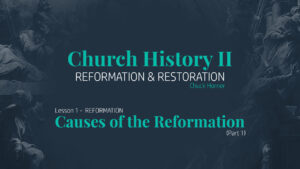
Lesson 1: Reformation - Causes of the Reformation (Part 1)
The Reformation began around 1500. But what caused such a giant as the Roman Catholic Church to be seen as needing reform? Chuck Horner begins this series by explaining the long-term problems such as celibacy, simony, and indulgences, as well as the short-term problems including moral bankruptcy, nationalism, and individualism.
-
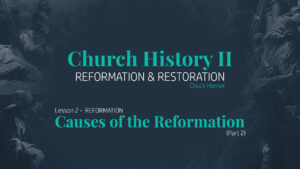
Lesson 2: Reformation - Causes of the Reformation (Part 2)
The most prevailing influence on people’s lives in the 16th century was the Roman Catholic Church. In this lesson Chuck Horner talks about some principles that helped trigger the Reformation such as salvation by faith instead of works, all sufficiency in Scripture instead of Catholic rules, and a priesthood of all believers instead of the Catholic clergy.
-
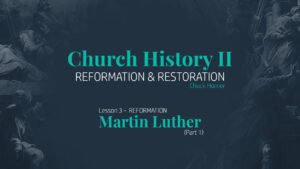
Lesson 3: Reformation - Martin Luther (Part 1)
Martin Luther (1483-1546) – German Reformation Certain men stand out in the annals of time who change the course of current events of their day. In this lesson Chuck Horner begins the life of Martin Luther and the German Reformation, from his teaching that began in earnest in 1512 to nailing up his 95 Theses in Wittenberg in 1517.
-
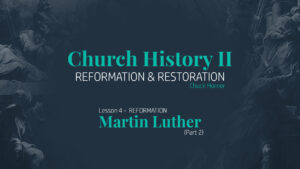
Lesson 4: Reformation - Martin Luther (Part 2)
1519-1580s Martin Luther was not afraid to oppose the infallibility of the Pope and debate against the selling of indulgences. His work and creed to reform the current Roman Catholic Church system changed the course of religious history. Chuck Horner delves further into the fascinating history of the Reformation and the life of this great reformer.
-
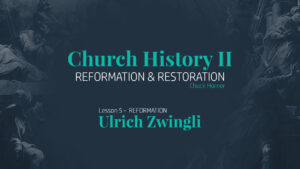
Lesson 5: Reformation - Ulrich Zwingli
Ulrich Zwingli (1484-1531) – Swiss Reformation
-
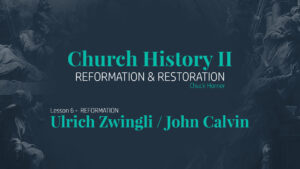
Lesson 6: Reformation - Ulrich Zwingli / John Calvin
1531-1541 John Calvin (1509-1564) – Continued the Swiss Reformation
-
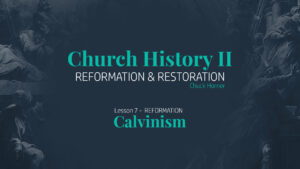
Lesson 7: Reformation - Calvinism
The five points of Calvinism were first developed by Augustine, but formalized at the Council of Dordt in 1618-1619. Chuck Horner takes a look at the T.U.L.I.P. of Calvinism, predestination, and the theology behind this doctrine.
-
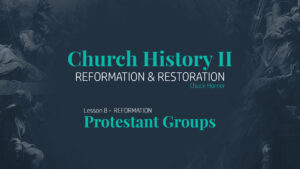
Lesson 8: Reformation - Protestant Groups
1525-1563 More and more divisions occur when man is put in the position of authority instead of God. As history marched on, people went off in different directions from both the Catholic Church and the Reformation. Chuck Horner talks about different groups that sprung from this such as Anabaptists in 1525, Baptists, Mennonites, and Unitarianism. He also discusses the shortfalls of Calvinism, and the Catholic Counter Revolution in 1545.
-
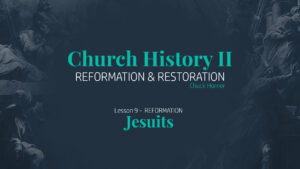
Lesson 9: Reformation - Jesuits
In 1540, the Society of Jesus was approved by Pope Paul III, founded in 1534 by Ignatius Loyola. The members were known as Jesuits. Chuck Horner discusses this religious order of loyal monks, its major function, the ideas they developed, and the rules they were to keep.
-
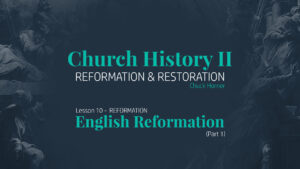
Lesson 10: Reformation - English Reformation (Part 1)
1534-1600s Chuck Horner talks about the actions of Henry VIII, the Church of England, and the Bible being printed in English. Other groups that sprang up within the Reformation: Dutch Reform (1567), Congregational Church (Robert Brown, 1581), Presbyterian church (Thomas Cartwright, 1572), Puritans (late 1500s), Quakers (George Fox & James Naylor, about 1650), and Baptists (John Smyth & Thomas Helwys, early 1600s).
-
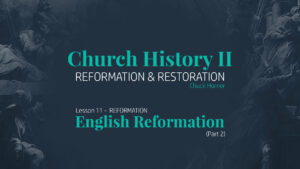
Lesson 11: Reformation - English Reformation (Part 2)
Chuck Horner discusses more denominational groups: Methodists (John and Charles Wesley, George Whitfield) and the Episcopal Church. He explains what the Thirty Years War was about, the Peace of Westphalia in 1648 and its results, the Divine Right of Kings, and what happened when reason and science were pitted against Christianity in the 17th and 18th centuries.
-

Lesson 12: Reformation - Religion to America
In this lesson, Chuck Horner discusses denominationalism in America from the 17th to 19th centuries. He looks at the new colonies of America and their various religious groups and religion in a new nation. He also discusses the Great Awakening in the 1600s (Jonathan Edwards, William Tennant, T.J. Frelinghuysen, George Whitfield), the Industrial Revolution in the 1800s, and religion and philosophies in the 1800s (Charles Darwin, Evolution, “Higher Criticism”).
-
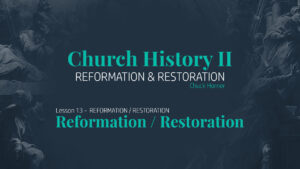
Lesson 13: Reformation / Restoration
1800s As the study shifts from Reformation to Restoration, Chuck Horner talks to us about more religion and philosophies in 19th-century America such as “Lower Criticism” and Secularism. He also talks about missionaries like William Carey, David Moffat, David Livingston, and Robert Morrison, and American social reforms and revivalism.
-
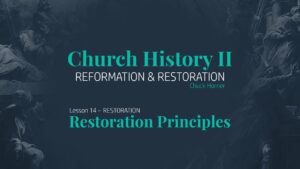
Lesson 14: Restoration - Restoration Principles
God is displeased when people depart from His perfect standard. Yet He does desire restoration, and there is even a pattern of this in the Old Testament. Chuck Horner delves into Scripture as he considers principles of restoration in this video.
-
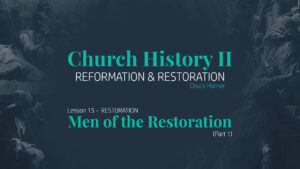
Lesson 15: Restoration - Men of the Restoration (Part 1)
1735-1844 When studying a movement, it’s a good idea to study those who made up that movement. Chuck Horner takes a closer look at James O’Kelley, Elias Smith, Dr. Abner Jones, Barton W. Stone, and the parts they played in the Restoration movement.
-
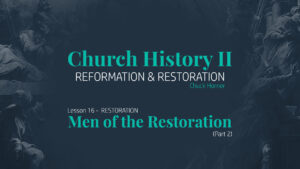
Lesson 16: Restoration - Men of the Restoration (Part 2)
1763-1866 In this lesson Chuck Horner continues to delve into the lives of men who worked in the Restoration period. Thomas Campbell and Alexander Campbell are the large focus here as they sought to use the New Testament as the standard for Christianity. Chuck also shows the difference between reformation and restoration.
-
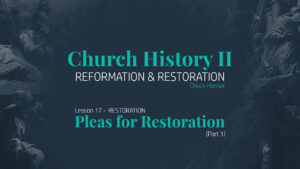
Lesson 17: Restoration - Pleas for Restoration (Part 1)
God has provided blueprints and has given specific instructions and uses specific terms. We have no privilege to change or reform what He has laid out. We should never hold our own ideas as superior to His. Chuck Horner gives important pleas of restoration for our consideration that pertain to the Church today.
-
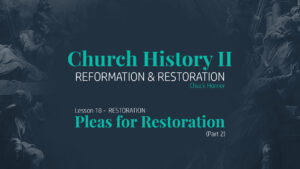
Lesson 18: Restoration - Pleas for Restoration (Part 2)
In the final lesson of this series, Chuck Horner shows us examples from Scripture of a lack of commitment to the Lord’s cause. What should we have in the Church that denominations do not have? There are grave consequences when restoration dies, and we cannot afford to turn away from truth!
Lesson 4: Reformation - Martin Luther (Part 2)
Description
1519-1580s Martin Luther was not afraid to oppose the infallibility of the Pope and debate against the selling of indulgences. His work and creed to reform the current Roman Catholic Church system changed the course of religious history. Chuck Horner delves further into the fascinating history of the Reformation and the life of this great reformer.




